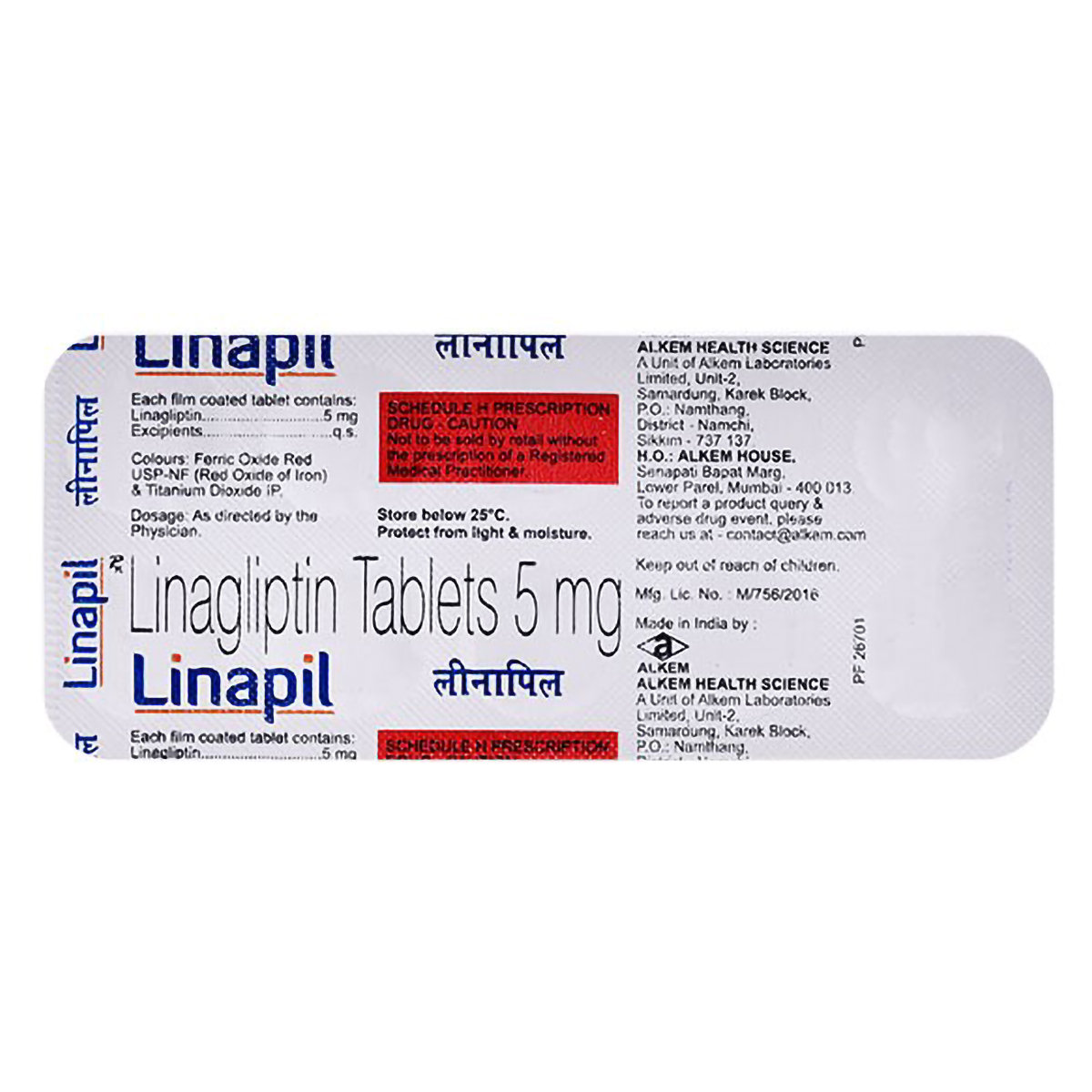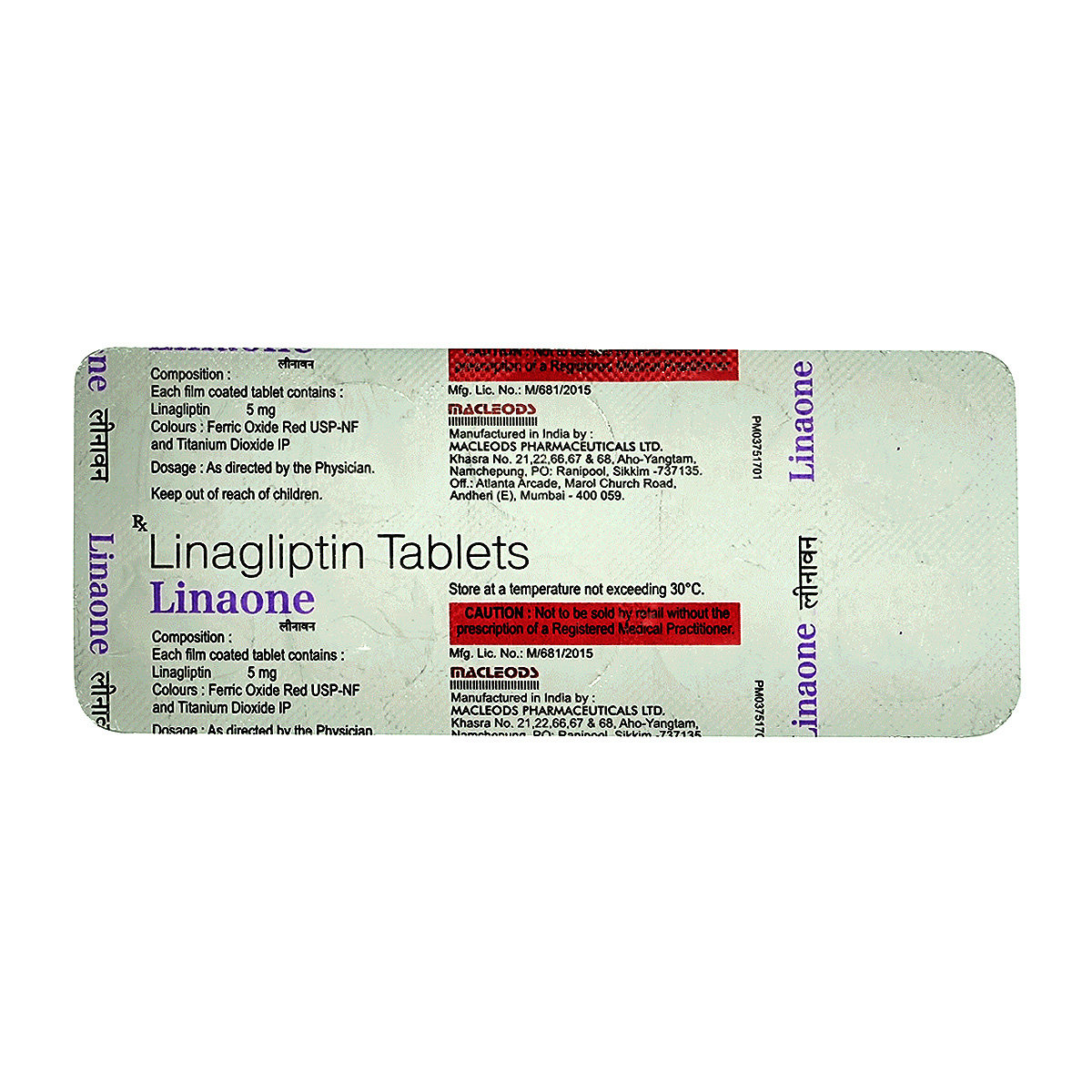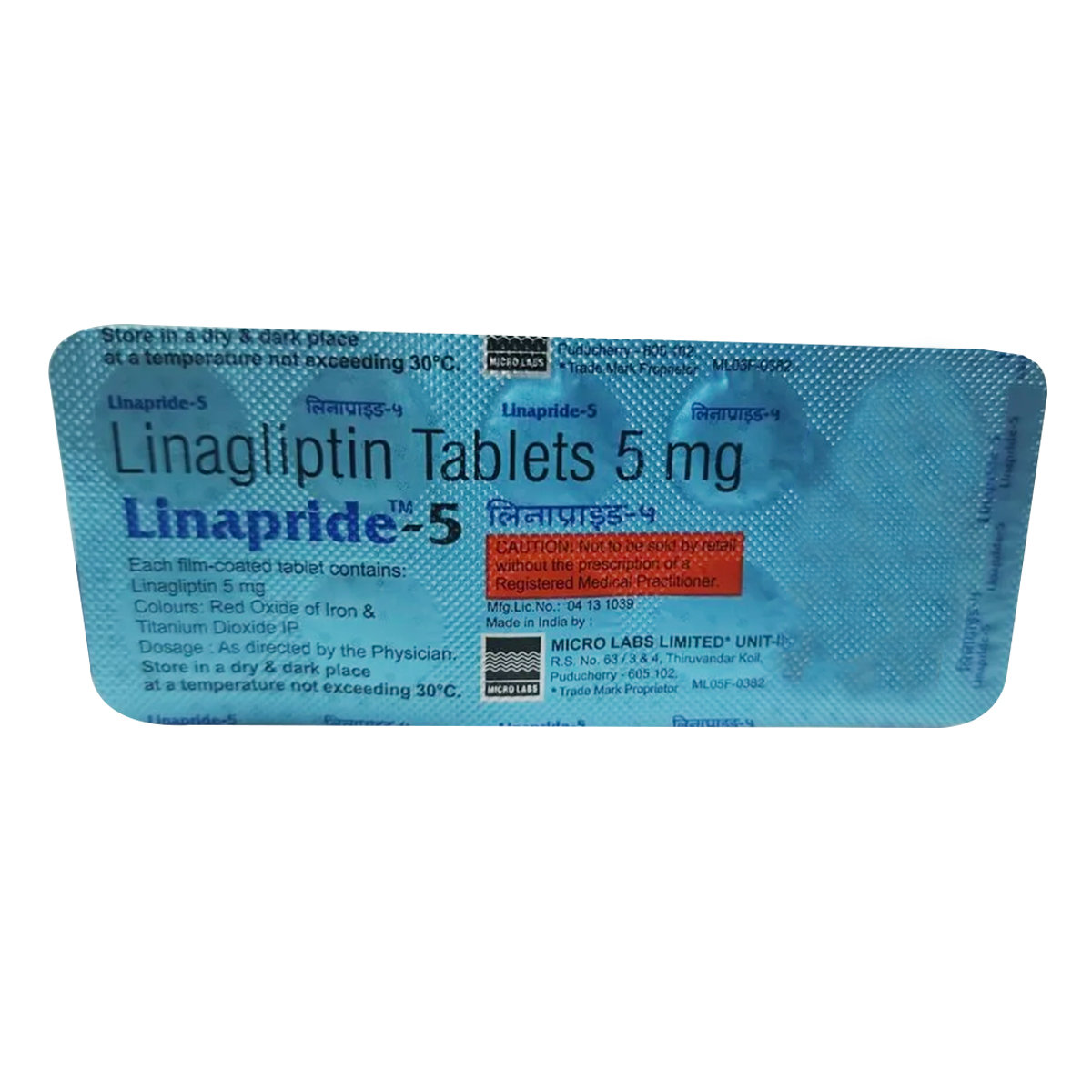Linagliptin
About Linagliptin
Linagliptin is an anti-diabetic medication primarily used to treat type 2 diabetes in adults along with diet and lifestyle changes. It is used alone or in combination with other drugs to lower blood sugar levels. People with type 2 diabetes either do not produce enough insulin, or the insulin produced cannot perform its function in the body (insulin resistance). Middle-aged or older individuals are most likely to suffer from type 2 diabetes, also known as adult-onset diabetes.
Linagliptin contains Linagliptin, which belongs to the class of dipeptidyl peptidase-4 (DPP-4) inhibitors used Linagliptin is prescribed for the condition of type 2 diabetes when diet and exercise alone cannot control their blood sugar levels. It works by blocking the action of DPP-4 (an enzyme that destroys the hormone 'Incretin'). The enzyme 'Incretins' helps produce more insulin only when required and reduces the liver's blood sugar level when not needed. Linagliptin should not be used in patients with type 1 diabetes and for the treatment of diabetic ketoacidosis.
Take Linagliptin as prescribed. However, it should be taken at the same time of the day each time for best results. Your doctor will recommend you how often you take Linagliptin based on your medical condition. The most common side effects of Linagliptin are hypoglycaemia (low blood glucose levels), upper respiratory tract infection, nasopharyngitis (infection of nose and throat with common cold), and headache.
Linagliptin should not be stopped even if you feel better, without consulting your doctor as sugar level keeps changing. If you stop taking Linagliptin abruptly, it may increase your sugar levels, which could further increase the risk of eyesight loss (retinopathy), kidney (nephropathy) and nerve damage (neuropathy). Linagliptin should not be taken if you have severe kidney or liver disease. Please inform your doctor if you have any heart disease is or planning to get pregnant or breastfeeding.
Uses of Linagliptin
Medicinal Benefits
Linagliptin is primarily used to treat Type 2 diabetes mellitus. It contains Linagliptin, which belongs to the class of dipeptidyl peptidase-4 (DPP-4) inhibitors used Linagliptin is prescribed for type 2 diabetes when diet and exercise alone cannot control their blood sugar levels. It works by blocking the action of DPP-4 (an enzyme that destroys the hormone ‘Incretin’). The enzyme ‘Incretins’ helps produce more insulin only when required and reduces the liver's blood sugar level when not needed. Linagliptin should not be used in patients with type 1 diabetes and for the treatment of diabetic ketoacidosis. Thus, Linagliptin plays a vital role in controlling blood sugar levels and prevents serious complications of diabetes like eyesight loss (retinopathy), kidney (nephropathy), nerve damage (neuropathy), diabetic foot ulcer and delayed wound healing.
Directions for Use
Storage
Side Effects of Linagliptin
- Hypoglycaemia (low blood glucose levels)
- Upper respiratory tract infection
- Nasopharyngitis (infection of nose and throat with common cold)
- Headache
Drug Warnings
Linagliptin should not be taken if you are allergic to Linagliptin or any of its ingredients. Please inform your doctor if you are pregnant or breastfeeding before starting Linagliptin. Prolonged intake of Linagliptin may cause acute pancreatitis (swollen pancreas), and critical kidney problem. Increased risk of hypoglycaemia (low blood sugar level) can occur when Linagliptin is added to other anti-diabetic agents or insulin therapy. In this case, your doctor may adjust the dose of Linagliptin. Severe allergic reactions might occur in some patients taking Linagliptin like anaphylaxis, angioedema (swelling under the skin), and exfoliative skin conditions including Stevens-Johnson syndrome. Safety and efficacy of Linagliptin in children under 18 years have not been established, so it should not be given to them. Patients taking digoxin (a heart medicine) with Linagliptin should be closely monitored as severe drug interaction has been observed. Linagliptin should not be used in patients with type 1 diabetes and for the treatment of diabetic ketoacidosis.
Drug Interactions
Drug-Drug Interactions: Linagliptin interacts with heart condition drugs (digoxin), diuretic (furosemide), steroids (budesonide), antibiotic (rifampin), anti-epileptic drugs (phenytoin, topiramate, lamotrigine), heart-related chest medicine (ranolazine), Beta-blocker medications ( metoprolol, propranolol, glaucoma eye drops such as timolol) insulin, and other antidiabetic medicines.
Drug-Food Interactions: Intake of excessive alcoholic beverages may increase the chance of a life-threatening condition known as Lactic Acidosis. So, avoid intake of alcoholic beverages with Linagliptin. Also, inform your doctor if you are taking St. John's wort (a natural remedy for depression).
Drug-Disease Interactions: Linagliptin may interact if taken in heart problems, high triglycerides (a type of fat in the blood), pancreatitis, gallstones, alcoholism, and kidney problem.
Drug-Drug Interactions Checker List:
Safety Advice

Alcohol
unsafeAlcohol should not be consumed along with Linagliptin as it is known to interact and lead to unpleasant side effects.

Pregnancy
cautionLinagliptin is a category B pregnancy medication. So, its safety in pregnant women is not established. So, it should be taken only if prescribed by a doctor.

Breast Feeding
cautionIt is not known whether Linagliptin passes through the breast milk or not. So, it should be taken only if prescribed by a doctor.

Driving
cautionLinagliptin has no influence on the ability to drive and use machines. However, dizziness and drowsiness have been reported, which may affect your ability to drive or use machines.

Liver
cautionIf u have or had a history or evidence of any liver-related diseases, please consult the doctor before taking medicine.

Kidney
cautionIf u have or had a history or evidence of any kidney-related diseases, please consult the doctor before taking medicine.

Children
unsafeLinagliptin is not recommended for children below the age of 18 years.
Habit Forming
Diet & Lifestyle Advise
- Fill your half plate with starchy veggies, a quarter with proteins, and a quarter with whole grain.
- Eat at regular intervals. Do not take a long gap between a meal or snack.
- Monitor your blood sugar level regularly, especially when there are lots of fluctuations.
- Invest at least 150 min of moderate-intensity physical activity or one hour and 15 minutes of high-intensity exercise every week.
- Lose weight gradually to achieve a healthy body mass index (18.5 to 24.9).
- Replace refined carbohydrates containing whole-grain foods and increase the intake of fruits and veggies and other fiber-enriched foods.
- Reduce intake of saturated fat (or hidden fats) in food like chips, crisps, pastries, biscuits, and samosas. Choose omega 3 fatty acid-containing oils for daily cooking. You can use palm oil, mustard oil, groundnut oil, rice bran oil and safflower oil for frying.
- Do not take stress as it may elevate your blood sugar level. You can adopt stress management techniques like mindfulness to control stress-related blood sugar changes.
- Opt for low-fat dairy products (low-fat yogurt, fat-free milk, and cheese, etc.).
- Keep your blood pressure as normal (140/90) as possible as it reduces the risk of cardiovascular diseases in diabetes patients.
Special Advise
- Keep your blood pressure as normal (140/90) as possible as it reduces the risk of cardiovascular diseases in diabetes patients.
- Monitor your blood sugar level regularly especially when there are lots of fluctuations.
Patients Concern
Disease/Condition Glossary
Diabetes (Type 2): It is a condition where the body cannot make sufficient insulin, or the insulin that it makes doesn't work properly or is utilized by our body. This can cause high blood sugar levels (hyperglycemia). Type 2 diabetes symptoms include increased thirst, frequent urination at night, slow wound healing, increased hunger, fatigue, and blurred vision. There may be weight gain in some cases, while in rare cases, weight loss may be observed. The complication of type 2 diabetes also includes neuropathy (nerve problems), nephropathy (kidney problems), and retinopathy (damaged retina of eyes or blindness), loss of limbs, sexual dysfunction, and increase the chance of heart attack or stroke.
FAQs
Linagliptin contains Linagliptin, which belongs to the class of dipeptidyl peptidase-4 (DPP-4) inhibitors used Linagliptin is prescribed for the condition of type 2 diabetes when diet and exercise alone cannot control their blood sugar levels. It works by blocking the action of DPP-4 (an enzyme that destroys the hormone ‘Incretin’). The enzyme ‘Incretins’ helps produce more insulin only when required and reduces the liver's blood sugar level when not needed. Linagliptin should not be used in patients with type 1 diabetes and for the treatment of diabetic ketoacidosis.
Type 2 diabetes is a common form of diabetes. The body cannot make a sufficient amount of insulin and the body's insulin does not function properly. The blood glucose level increases, and symptoms such as frequent urination, increased thirst, and increased hunger . Diabetes, if left untreated or not treated properly, can cause long-term complications like nerve damage, kidney damage, eye damage, foot problems, and fall under a higher risk of developing heart diseases.
Hypoglycemia refers to low blood sugar levels. Linagliptin can cause hypoglycemia. The symptoms of hypoglycemia include nausea, headache, irritability, hunger, sweating, dizziness. Hypoglycemia can occur if you miss or delay your food, drink alcohol, over-exercise or take other antidiabetic medicine along with this medicine. People with diabetes are advised to keep a quick sugar source like glucose tablets, honey or fruit juice.
Linagliptin should be avoided in patients who are allergic to any of this medicine's components or excipients. It should be avoided in patients suffering from moderate to severe kidney disease and in patients with underlying metabolic acidosis, including diabetic ketoacidosis, consult your doctor for further advice.
No. Linagliptin is only prescribed to treat type 2 diabetes, also called 'non-insulin-dependent diabetes.'
In type 1 diabetes, cells in the pancreas that make insulin are destroyed, and the body is unable to make insulin. Insulin is a hormone that helps your body's cells use glucose for energy. The condition is usually diagnosed in children and young people, so it used to be called juvenile diabetes.






